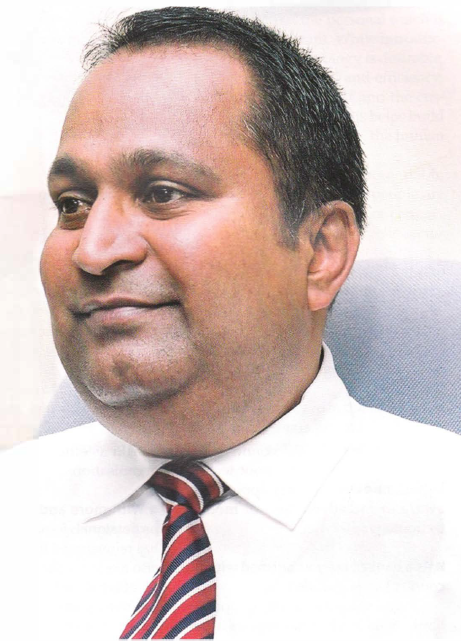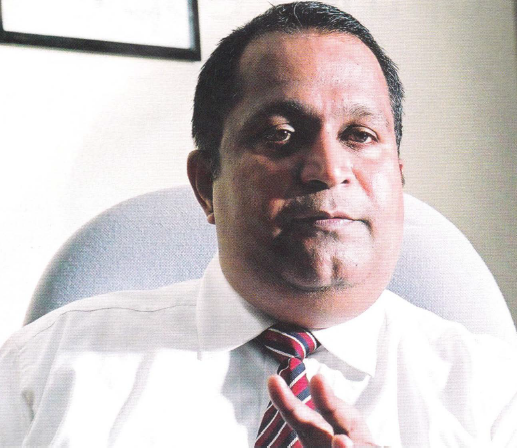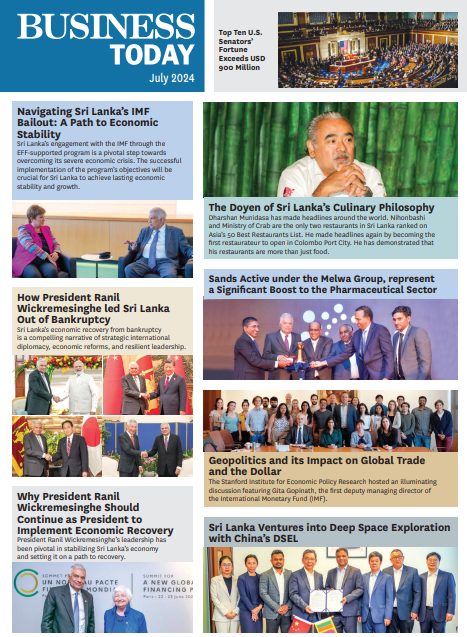The public sector can effectively compete with the private sector. What is required is the introduction of good management practices and marketing strategies in addition to upgrading HR capabilities, says Deepal Abeysekera, Head of Marketing and Public Affairs of the People’s Bank.
In an interview with Sassanka Samarakkody, he speaks about the many challenges involved in operating a profit-generating State enterprise and the important role played by marketing.

Can you give an overview of the People’s Bank and its present performance in the market?
The People’s Bank has been in operation for over 45 years with a client base of around 10 million, out of the country’s total population of 20 million, which means we have a huge clientele. The bank is represented in every nook and corner of the country, including the North, where we have 14 branches. We have the largest branch network with 631 branches and pawning centres spread across the country.
We offer a variety of banking services to different segments of the market, which include corporate banking in addition to personal banking services. We believe in value addition, and always strive to give a quality product and service to our customers.
Over the years the bank has built up its strength and we are now in the process of enhancing our marketing and technological skills and introducing modern banking practices.
How does a State bank such as the Peoples Bank cope with the strong competition from the private banks?
I must say where innoYative technology is concerned, some of the State banks have taken the lead in offering conveniences across the country. The People’s Bank is presently in the process of launching a major co-banking initiative, where all our branches would be linked to a network for real-time banking. Which means, irrespective of where they have the account, our customers will be able to conduct any type of transaction from anywhere in Sri Lanka.
This no doubt will be a huge strength for us, because with the added advantage of our large branch network, very soon we will be able to provide a quality service at the doorstep of our customers, in addition to other electronic banking services.
While concentrating on our technological platform, the Bank ha also trained staff members, most of whom have been with the bank for a long period and are therefore well aware of the pulse of the customers, who interact and have a close dialogue with them. They provide a friendly and very personalised serviced especially at the rural level, where the practice of banking is spreading fast.
Speaking about the rural sector, what has been their response to the introduction of modern technology, such as ATM facilities?
I think they are ready for it. Even when we interact with people, who come from all over the country, they have some knowledge about technological innovations. They appear to be aware of the advantages of modern technology.
As a banker, are you satisfied with the country’s savings ratio?
If you take the Asian region, Sri Lanka’s individual savings as a percentage of the GDP is rather low. Even our giant neighbour India has a higher savings ratio.
The People’s Bank has always taken the lead in introducing various savings schemes, tailor-made to different age groups and segments of the population. For instance, we have specific savings accounts for minors, women, the employed, Sri Lankan expatriates, and so on. In fact we cover the entire spectrum and also add value to our services by conducting special monthly campaigns.
Several State sector enterprises have in recent times undergone a process of restructuring. What are your views on this?
This is a very interesting subject. We are living in an era where the ownership of a large number of strategic entities lies with the State and as a result, a need has arisen for these to be run as efficient and profit-making organisations.
With more and more private sector professionals joining the State sector, it has rejuvenated the operations and has also made it a challenging undertaking. What is needed to succeed and achieve positive results is identifying and focusing on the key areas, such as human resources and public relations, for instance, and building a team who will work towards identified goals?
The subject of marketing should be better understood in the State sector and efficient marketing divisions should operate in these entities. The chief marketing officer must play a key role in the organisation. He must function as a marketing-oriented CEO and motivate the staff. You need to convince them that sometimes if the required skills are not available, they should be built up or introduced.
When is comes to restructuring of State ventures, what is required is a development oriented programme, taking into consideration the important role played by marketing and customer relations in the operational process and move from linear, process based tools, towards helping employees get things done across functional, hierarchical and business unit boundaries.
With regard to customer relationships, what seem to be lacking in the State sector is the dynamism and the customer-oriented attitude of the private sector. How do you think this aspect could be addressed?
There is a general belief in some quarters that in order to bring about the required improvement, the organisational culture should be changed. But this is easier said than done. It’s a time consuming process for any organisation to undertake. What could be addressed is, changing the attitudes of the staff.
In any organisation there are habitual moaners. You ask them to do a simple task, and they will give you so many reasons why they cannot do it. Then there are the cynics, whose attitude is basically negative. They usually scoff at any new idea or innovation. Their thinking is, ‘it has been tried before – so it is not going to work.’ They need to be managed competently.
Marketing efforts certainly cannot succeed without the cooperation of customer relationships management efforts; both are equally important for the success of any organisation, be it the private or public sectors. People’s Bank, being a State organisation, recently won the Power of People (POP) award as the best loved entity in the banking and financial services sector.
In your opinion, how could the public sector effectively compete with the private sector?
It is important to strengthen State organisations with qualified professionals. If the required manpower is not available in house, then professionals from the private sector should be brought in, until the human resources are developed in-house.
People want to change; they want to be the best. In order to fulfil their aspirations, there should be an assessment pattern within an organisation, where hard work is rewarded and appreciated. What usually takes place in the public sector is those who work hard, a well as those whose performance is mediocre are all treated in the same manner. This results in a lack of motivation and a lethargic attitude towards work; their level of performance drops and ultimately the organisations ends up as a loss-making entity.
Regular staff appraisals are important, maybe on a half-yearly or yearly basis, and those who perform well should be given some kind of recognition, maybe by introducing a rewards scheme. This will no doubt motivate the staff to improve their performance and will gradually change their attitude towards work. I have found that in some of the well-managed State sector entities, this practice has been successfully implemented.
I have also observed that most of the private sector banks started with public sector employees at the initial stage of the operation, because most of them have years of experience in the banking sector, which is a huge asset to any bank hiring them. The key ingredients for better HR performance in the private sector are, motivation and the attractive incentives offered to them. They are interested in sharing knowledge across boundaries.
Another drawback that the public sector has to face is the very strong unions, whose actions can cripple the entire operation at regular intervals. Your comments?
Yes, they are the movers and shakers and it’s very important to take them into confidence and to have a regular dialogue with the management. We will not be able to achieve an ideal situation overnight, but it should be a gradual process and it will only succeed if a genuine effort is made by the management to interact with the unions in a positive manner. It’s actually a case of changing attitudes, which ultimately results in confidence building.
Would you say that the country’s banking sector is on par with the rest of Asia?
Our banking sector is quite modem and is also competitive have a number of multi national banks in Sri Lanka that have been operating in the country for a long period of time.
As a local bank, the People’s Bank has been able to compete quite well I would say. We have had a good growth rate in savings over the years and the customer base has increased. However, in order to compete with the private banking sector, we need to be innovative and improve our HR and IT capabilities.
What are the high growth sectors of the Peoples Bank?
We are the leaders in the savings category, which is a result of the strength of the brand as well as the commitment of the staff. Each month we conduct awareness campaigns all over the island. We go to the customer instead of waiting for them to come to us.
The primary motive of the private sector is making profit, while the State sector enterprises have to also consider providing a service to the public. In such a situation, how could the State sector face this challenge
As far as the public sector is concerned, it’s marketing that needs to create a change in the overall outlook of the entity. Marketing efforts cannot succeed without considering the profit aspect.
When one speaks of marketing, it should always be profit oriented. Then you spend money, as an organisation, you need to make a profit. In my view, if a State enterprise is not making profit, it’s mainly due to the lack of consciousness about the importance of the profit angle.
A State sector entity, while playing its due role as a service provider to the public, should not forget the importance of being profitable, without being a burden to the public.
Considering the current global level of the banking sector, which is dominated by IT, what should be the future strategy for a country like Sri Lanka to follow?
I believe that the personal touch is still vitally important. While introduction of modem technology is desirable, since it can offer speed and efficiency, interaction between staff and the customer on a one-to-one basis helps build confidence. In other words the human touch is very essential.
“A State sector entity, while playing its due role as a service provider to the public, should not forget the importance of being profitable, without being a burden to the public”
Also, there is a lot of potential in the rural sector, where the people are ready and willing to embrace change. Whether it’s a private or public sector organisation, what is required to succeed is to be totally focused and also to be results oriented and in this respect, marketing should to play a major role. It no doubt is a challenge, but it can be quite a satisfying experience to see an enterprise flourishing.
You were employed in the private sector for many years and now you have shifted to the State sector. How did you cope with it, what has been your experience?
I think it’s really a mental state. Anyway, even if you leave a private company and join another, you will experience a difference. I have worked in the private sector for 19 years and joined the Peoples Bank in 2001.
I think the state sector can offer you a more challenging environment. As a strategic entity in the State sector, the People’ Banks plays an important role in the country’s economic development and needs to be efficiently supported. I would like to encourage more people employed in the private sector to join the State sector. It should not be a mere patriotic act, but should be regarded as an opportunity to be part of the country’s development process.







